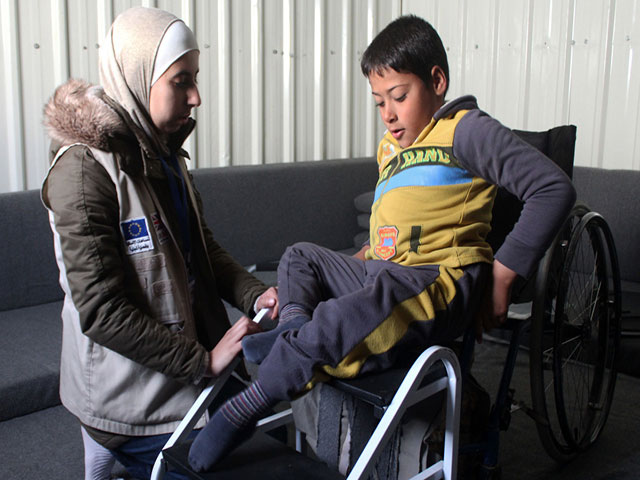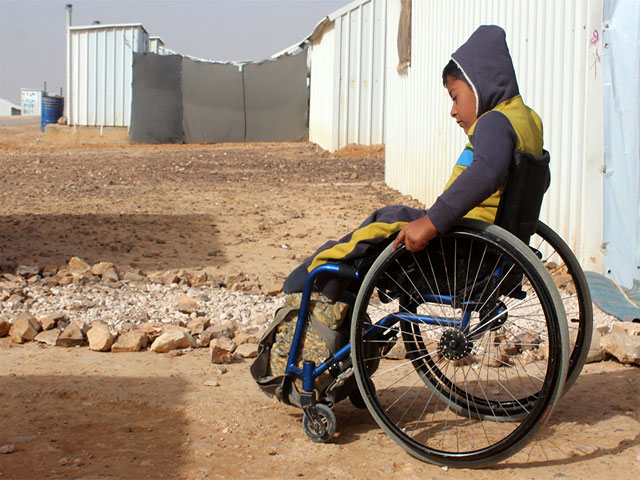A smile flashes across Ahmad’s face when Handicap International’s physical therapist, Noor, arrives in the family’s caravan. He only began his rehabilitation sessions a few weeks ago, but Ahmad really looks forward to them. Noor sits next to him and suggests they start their session. Ahmad’s parents move closer so they can learn the exercises and activities that should make their son’s life easier.
“We left the city where we lived a few months ago when we realized the conflict in Syria was unlikely to end. We tried to make sure Ahmad’s life was as normal as possible, despite the war. He had a hospital check-up every six months, and the manager of the factory where I worked gave me half an hour off at the start and end of the day so I could take him and fetch him from school. Just next door there was a center for people with disabilities,” explains Ahmad’s father, Asim.
“When we arrived here in Jordan, everything changed. It was difficult to see how Ahmad could go to school because we live really far from the camp school and he can’t walk.”

Noor helps Ahmad to get used to his wheelchair. Jordan. © Elisa Fourt / Handicap International
“I’m really looking forward to going back to school”
While Noor shows Ahmad the exercises that will make it easier for him to use his wheelchair, Mohammad, his younger brother, watches him closely. Alongside his physical therapy sessions, Ahmad has occupational therapy sessions, which will help him become more self-reliant. “I’m really looking forward to going back to school,” he says smiling. “And with the wheelchair, his dream will soon be a reality,” adds his mother Khawla, cheerfully.
After a few warm-up exercises, Noor asks Ahmad’s parents to bring out the wheelchair: it’s time for him to try it out. Asim admits he’s worried: a short, sharp knock is all it would take to tip his son over. But he’s happy that Ahmad will soon be able to go out and make friends the same age as him in the camp. Ahmad sits in the chair and moves forward slowly. Noor is next to him, guides him and gives him encouragement to make sure he makes the right moves.
“There’s no doubt about it. This will change his quality of life"
Once they get outside, Ahmad becomes more confident and goes faster. His parents and younger brother follow him enthusiastically. “There’s no doubt about it. This will change his quality of life ,and ours,” admits Asim. “It’s going to make things easier for us: we won’t have to carry him everywhere we go. He can move around by himself and become independent. We can visit our relatives in the camp more often, for example, without worrying about how complicated it’s going to be.”

Ahmad gets out and about at Azraq refugee camp. Jordan. © Elisa Fourt / Handicap International
Noor has already noticed a change in Ahmad’s behavior. “During our first session, Ahmad didn’t really believe we could do much for him. He didn’t think a wheelchair could make such a difference. He’s much more at one with himself and confident now.”
After he has tried his wheelchair outside, the session comes to an end and Ahmad goes back to playing with his younger brother. “They like building houses with our cushions or drawing the house we lived in back in Syria, with a beautiful garden,” say Asim and Khawla. Although their lives in Syria seem far away, Ahmad’s mother and father seem satisfied with small, everyday victories. Their son can move around more freely now.





